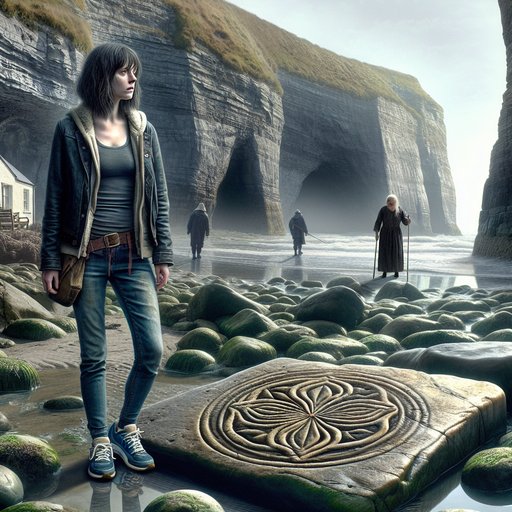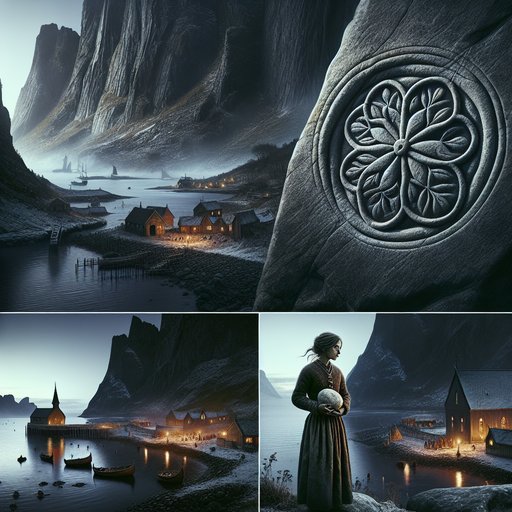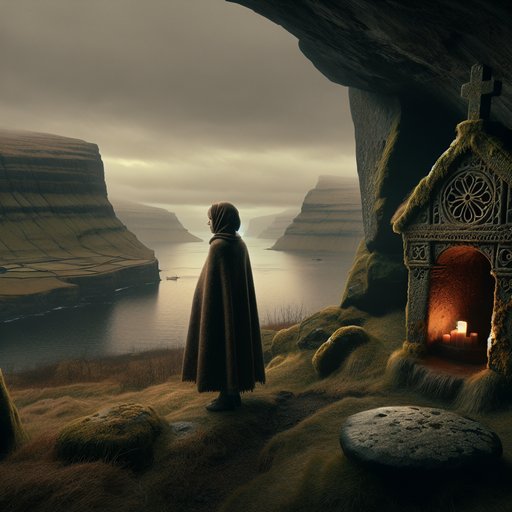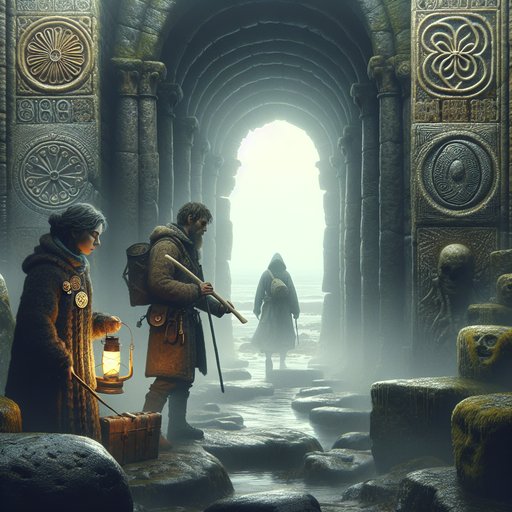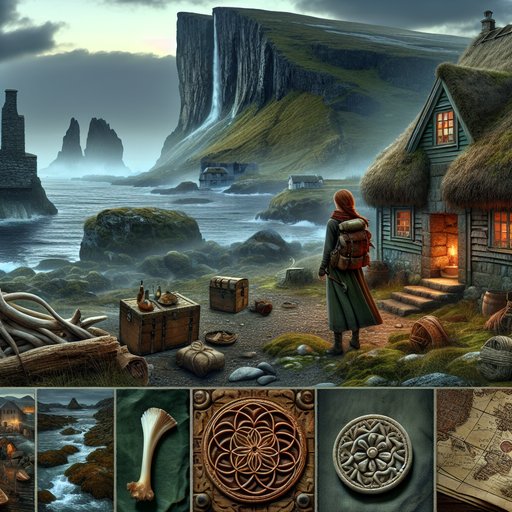CHAPTER 5 - The Valley Sings Twice and an Unlikely Ally
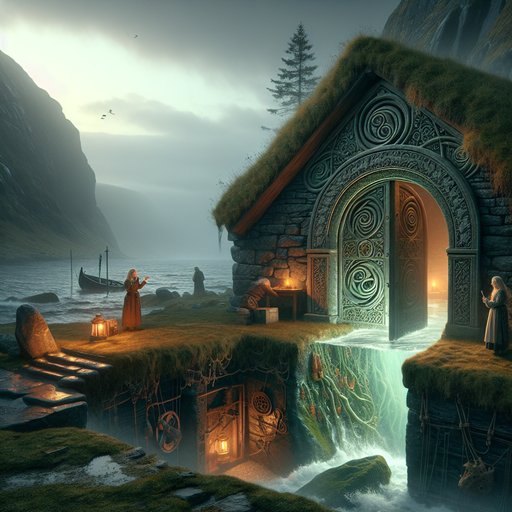
At dusk in Saksun, Barbra triggers an upside-down rosette on the church lintel with a resonant song and discovers a hidden stair beneath the turf. In an echoing chamber, she stalls at a mechanism that seems to require two voices, until unexpected help arrives: the elderly woman with the rosette brooch who once shunned her. Naming herself Sigrið, the woman admits leaving the kelp-tied whalebone warning but says Barbra’s true singing earned trust. Using a land-bone flute, the two align their notes with the fjord’s hum to open a deeper passage where a relief map and a warm “heart-stone” await. Sigrið shares guarded lore of the families who protect the Song Gate and warns of its power, then another surprise appears—the fisherman who had warned Barbra off, now offering grudging assistance and gear. As the mechanism awakens and water roars through a newly revealed descent, the map shifts, the rosette token heats in Barbra’s palm, and a lower iron-bound door begins to pulse. With the tide rising and the valley’s note surging toward a bone-deep vibration, Barbra must choose whether to press on with her new allies or retreat, ending on a tense cliffhanger.
Dusk lowered its gray veil over Saksun as the upside-down rosette above the little church’s lintel trembled under Barbra’s voice. The turf at her feet gave a soft shiver, as if the earth were listening, and the fjord’s low hum rode the wind up the valley in a long, patient breath. She stood in her tight jeans and tank top beneath a floral denim jacket, blue-and-white Asics speckled with peat, red hair wild in the salt air. Freckles she stubbornly disliked prickled with chill and focus as she matched the remembered phrase from Kirkjubøur to the humming undernote.
In the stillness between notes, a seam appeared in the grass, and a draft of cold, mineral breath touched her face like a hand from the underworld. She glanced back at the empty road, sensing the shadow that had flitted earlier, and steadied herself with the vellum. The tide notations crisscrossed its margin like a fisherman’s calendar, but the inked rosette at the top was inverted—just like the lintel—and the hum now seemed to rise through her boots. She sang again, letting the vowel bloom, and the lintel shivered in sympathy; beneath her, turf whispered and parted to reveal a narrow stone stair.
The opening bled darkness, damp and ancient, and her breath steamed as she crouched to enter. Alone is what she knew—alone since four years old, grandparents teaching her steady hands—so she went first without waiting for the watcher to reveal itself. The stair delivered her to a small chamber carved in concentric scallops, an ear tuned to catch any voice and return it softer. Two niches faced each other: one rosette carved upright in the left alcove, the right inverted, both slick with seepage and old salt.
She slid the resin-sealed bead from her pocket—the one from the first hidden plinth—and pressed it to the upright rosette, but it merely rattled against stone. The riddle from the resin box nagged: When the sea walks backward, the valley sings twice. Bring the bone not from sea. She tried to split her note, forcing her throat to hum low while her mouth tilted high, but the chamber rejected her clumsy overtone with a dull cough of echoes.
Footsteps scraped on the stair behind her. Barbra spun, shoulders squared, breath sharp, ready to bolt into the narrow like a fox. A lantern’s dull glow painted the doorway, then a figure stepped through—the elderly woman who had turned away at Tjørnuvík, rosette brooch glinting like a small commandment. Deep lines framed the woman’s eyes, but they were not unkind now; they looked like shorelines carved by weather.
“Barbra Dender,” she said in careful English, the name an oath and a welcome. “You sang true. So I came.”
Barbra’s throat worked around a tight swallow. “You left the whalebone at my door,” she said, not accusing, simply placing the piece on the board.
The woman’s lantern bobbed in a slight nod. “A warning,” she replied, “and a test. The ones who turn back when told to are not meant for this. You did not turn, but you did not break.
I am Sigrið.” She set the lantern on the plinth and drew from her coat a small flute carved from sheep bone, the grain pale and familiar. “Land-bone,” she said, tapping it. “Not from sea.”
Sigrið lifted the flute and released a thin, clean note that braided itself to the fjord’s hum threading down the stair. Barbra felt it like a thread laid along her spine, and she found the low ground tone with her own voice.
The chamber caught them, doubled them, and sent them back—valley sings twice—until the inverted rosette on the right began to revolve, grinding softly as lichen crumbled from its petals. A seam appeared between the alcoves, dust sifting like hourglass sand, and the cool scent of wet stone grew sharper. Sigrið glanced at Barbra. “If we go, we go careful.
Take nothing unless asked by the place to take it, and never lie about what you’ve seen.” Barbra thought of her glass cabinet at home and the promise she made to her grandparents to walk with integrity; she nodded. “I give my word.”
They edged into a low corridor where the walls swallowed their lantern’s light and fed it back in wavering bands. Old sconces bit into the stone, their saucers charred with the ghosts of lamb-fat lamps; wet prints of their Asics laid a dotted trail that smudged in the damp. The hum shifted as they walked, gathering a chord like a choir inhaling, and the floor tilted down toward a second chamber cut in a shallow oval.
At its center sat a stone plinth etched with wave-lines and a shallow cup that seemed sized for the bead. Barbra exhaled, placed the resin bead into the cup, and felt a tiny tremor pass up her fingertips, as though the plinth had a pulse that acknowledged her. Light unfurled in pale sheets from grooves in the plinth, crawling up the wall to lift a relief map of the island’s ribs and coves. Saksun’s lagoon bloomed like a silver oval; a thin crack traced underneath it toward a shaded mark beyond the church.
Sigrið breathed the map in like a prayer she’d once known by heart and half forgotten. “In storms,” she murmured, “we open and close. We ask the valley to hold what the sea would take. In famine, we ask the sea to herd fish.
But those who would silence the water can starve a coast.” Her voice was not a warning so much as a memory of warnings. Barbra lifted the flute and blew a trembling note. It fell flat at first, then settled as she remembered the phrasing of the chain-dance in Tórshavn, the way bodies around her had stitched the beat together with breath. The light on the map shivered and brightened, lines sharpening to show a narrow grate where the lagoon met a stream.
She, who rarely thought herself beautiful and never needed makeup to prove otherwise, felt the throb of something larger than herself calling back through her bones. For a moment she saw her grandparents’ kitchen—the glass cabinet they helped her install, the artifacts she had set there with care—and wondered at the shape of the story she was stepping into. The hum grew denser, water speaking in the rocks, and a trickle began somewhere behind the wall, gathering itself with purpose. “Quick,” Sigrið said, frowning at a notch that had spun open, revealing a slit beneath the plinth.
She dug at the moss packed there and looked at Barbra. “Your hands are smaller. There is a heart-stone. It will be warm.
The place asks you to take it; it will ask for it back.” Barbra lay flat, cheek damp against the stone, and reached into the slit. Her fingers brushed sleek basalt, a polished oval that yielded a slow heat to her touch, and she coaxed it free like a robin’s egg from a narrow nest. Footsteps sounded again above, heavier this time, the stair groaning as another body descended. Barbra rose with the heart-stone balanced in her palm and turned as a familiar figure shouldered through—one of the fishermen from Tjørnuvík, face salt-burned, jaw set.
He carried a length of rope coiled like a sleeping eel and a tarred leather pouch. “So it’s you, Mikkjal,” Sigrið said, wary, the lantern’s flame trembling. He scanned the chamber’s glow and the two women, and something in his eyes softened, or perhaps it simply changed aim. “You’re stirring ghosts,” he told Barbra, voice low.
“If you’re set on it, you’ll need more than a song.” He tossed the rope at her feet and set down the pouch. “Corks, wax, and a wick. If the water rises, you seal and breathe.”
Barbra accepted the weight of the rope, surprised by the prick of gratitude for help from a man who had warned her off in the surf spray. Unexpected allies, she thought, the island rearranging itself in her favor because she had asked it the right way.
The heart-stone warmed her hand like a pulse; the rosette ring Sigrið had slipped onto her finger as token of trust glowed faintly in the lantern light. Mikkjal crouched by the wall, found a seam, and put his shoulder to it; with a grinding complaint, a lower lip of stone sagged to reveal a slick stair vanishing into darkness. From below came a roar like distance compressed, the hum coalescing into a note that rattled her ribs. The map’s light shifted again, the silver oval of the lagoon pulsing as if breathing; the relief rotated a fraction, and a new line lit like a wick, pointing down the fresh stair.
Barbra’s freckles burned with the same heat she felt in her palm; behind her, the corridor sighed as if air were being gently sucked from the chambers. Sigrið touched Barbra’s shoulder, squeezing once. “If we go now, we go deep and we might not come back before the tide turns,” she said. “If we wait, the gate may set for another cycle.” The iron-bound edge of a door below pulsed with a slow, insistent light, and the roar deepened into a chord that sounded like a hundred throats humming from the navel of the earth.
Barbra glanced from Sigrið to Mikkjal, from the rope to the flute, from the warm stone in her hand to the dark mouth that promised the truth of centuries. She had always gone where the map turned strange, always trusted her legs to carry her up and down the world, always chosen the integrity of the story over the easier path. The valley sang twice around her, a harmony that felt both like a welcome and a warning. She took one step toward the stair and felt the floor subtly tilt, as if the island itself held its breath.
What, exactly, had she just called to?


















